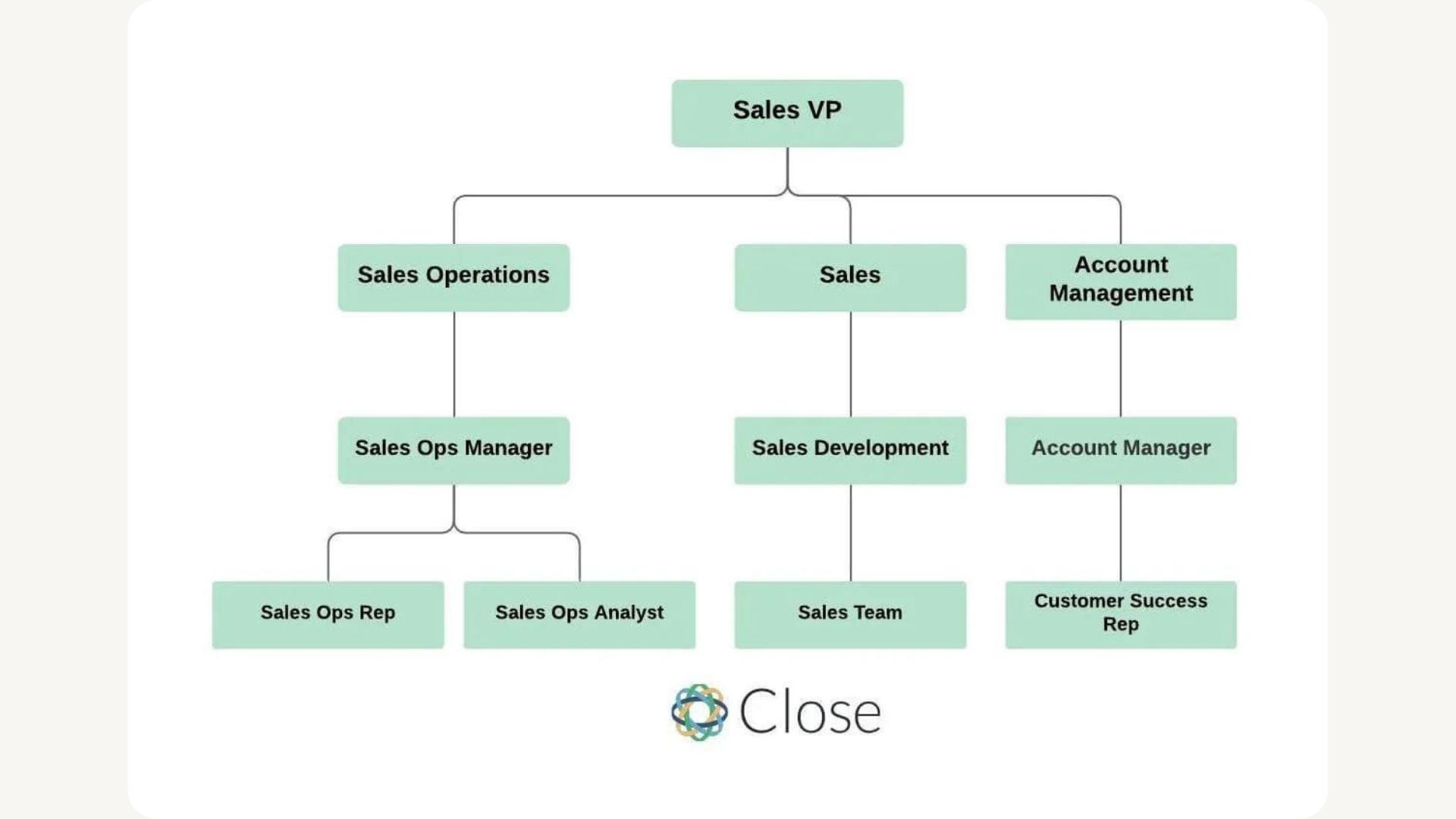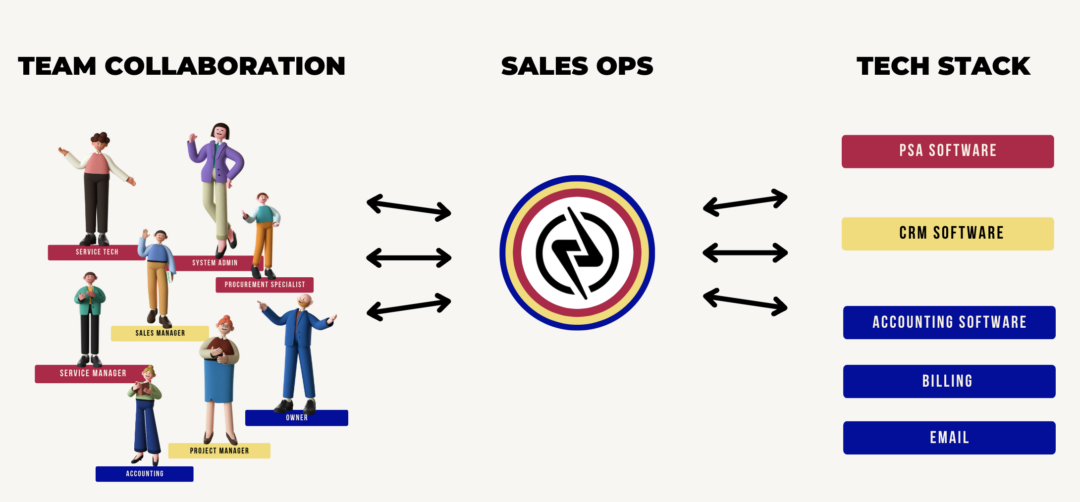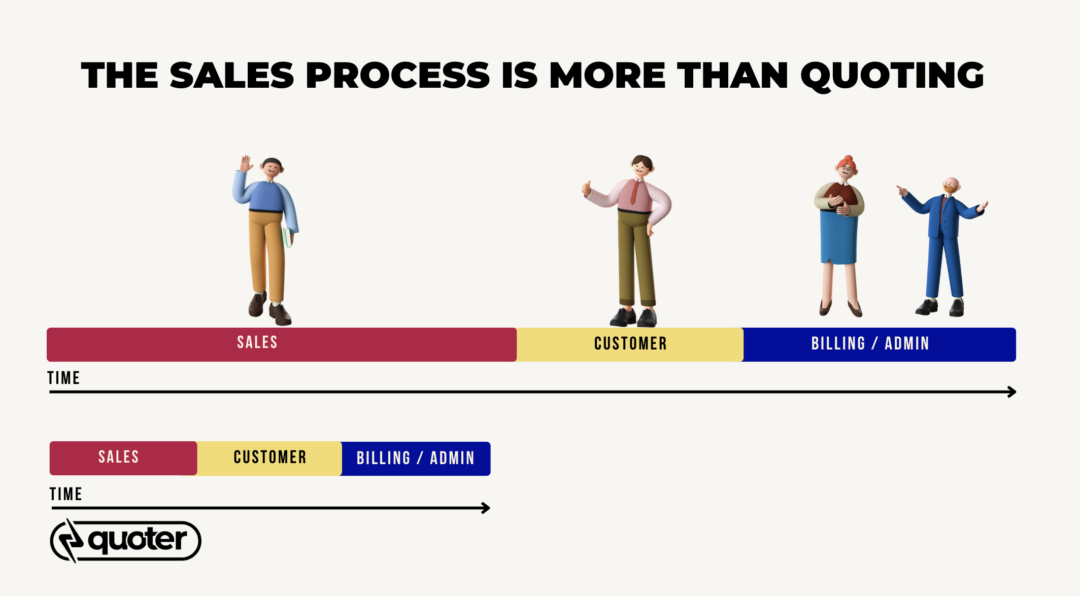Thinking of Quoter as the Sales Ops role in your business
Sales is much more than creating and sending a quote. It’s a collaborative process that is overlooked by many SMBs.
Over the last two years, team collaboration has changed dramatically.
How we communicate, do business, and prioritize our work has moved out of the office and into remote or hybrid work environments. There are pros and cons to this new reality, but one of the areas we haven’t seen catch up to this change is the business sales process.
In this article, we share insight on what we believe is the biggest opportunity for service-based businesses to start thinking about how their sales process fits into their organization and recognizing the needs of all stakeholders involved.
What is Sales Ops?
Our friends at Sales Hacker say it best:
Sales operations refers to the unit, role, activities and processes within a sales organization that support, enable, and drive front-line sales teams to sell better, faster, and more efficiently. Through strategically implemented training, software tools and engagement techniques, sales ops leaders enable sales reps to focus more on selling in order to drive business results. But perhaps more than anything else, sales operations bring a system to selling.
This often overlooked and sometimes under-appreciated department uses data to drive strategy, best practices to guide training, and technology to hack success. Because of its broad scope and deep impact on both top-line (productivity) and bottom-line (efficiency) performance, the sales ops department has become a strategic and indispensable component of a mature sales organization, especially in the enterprise, SaaS and B2B space.
Source: https://www.saleshacker.com/what-is-sales-operations

Sales operations and roles identified in the image above from Close are typically reserved for mid-market or enterprise businesses.
Watch our Sales Ops Discussion with
Justin Nguyen from ScalePad
How does Sales Ops fit into SMB?
Small and medium-sized businesses may not have someone dedicated to Sales, let alone a Sales Ops position. This creates gaps in the organization where the people on the team are not fully aware of how they could be doing their job more effectively.
We look at Quoter as Sales Ops enablement for small and medium-sized businesses. Businesses that are not hiring for a Sales Ops role and different parts of the sales process are shared between different roles on the team. These teams collaborate on several tools including Zoom, Slack, Teams, and use project management tools like Jira or Asana. Customer records are maintained in a CRM, and services in a PSA. These tools enable us to be productive, work from anywhere, and change with us as technology changes.
However, before the work gets scheduled there is a sales process that can involve multiple people and isolated environments. Quotes that are created in Google Docs and spreadsheets, downloaded as a PDF, attached to an email and sent out are time-consuming, and do not set up the right environment for collaboration. Quoting applications or tools on their own are also not very useful. They must rely on other technology and business tools to automate as much of the sales process as possible.

There are three stakeholder groups involved in the sales process.
1. Sales
For most SMBs, the salesperson or “team” could be someone in marketing or a service tech or owner, depending on the size of the company. The typical sales process involves responding to some sort of inquiry or event, either from sales or inbound from the customer. The following process will vary depending on the complexity or scope of work:
- Needs assessment, problem definition
- Discuss solutions, budget and timeline expectations
- Building a quote or proposal
- Sending the quote to the customer
- Contract Management
Large quotes can be several pages long, and it’s important to structure these documents in an organized way so that the customer can properly evaluate what is being proposed without getting overwhelmed. This can be done by organizing the products and/or services into “sections” with their own headings and subtotals. We also recommend creating “bundles” to group items that would be sold in a package to reduce clutter.
2. Customer
The customer plays a critical role in the sales process, as they are the deciding factor if you will be doing the work or not. It’s possible they are evaluating your quote against alternatives, and it’s important to consider their needs (beyond just winning on the best price).
The customer buying process will vary depending on the size of the project:
- Develop and submit an RFQ / RFP
- Collect quotes or proposals and evaluate
- Provide feedback, revise budget or scope of work
- Accept, sign and pay
The first impression matters! It’s important to maintain an updated design of your quote or proposal format. This applies to both new prospects and customers that have been with you for years. Businesses that are seasonal may turnover staff and the decision-maker might be someone new each year.
3. Billing / Administration
Upon approval, there are a few things that need to be done before the work begins. Making the deposit or payment collection a part of the customer process saves time on the billing/admin work. Integrating your quoting tool with your accounting software will “push” customer information and the quote is submitted as an invoice.
Recurring or memorized billing should not be a monthly responsibility of the bookkeeper. These repetitive tasks can be automated with the right implementation of Quoter and your payment processor.
Over time, being able to run sales performance reports as a business owner can bring insight into the areas of the business that can be improved, or challenge services or products that do not need to be a part of the business offering. Compare sales metrics against past years’ or better understand seasonality.
Team alignment of company growth goals starts with transparency on sales activity. We don’t need every. single. person. in the business sending quotes, but providing an environment where anyone can access, search, and oversee sales activity will help the team work more efficiently. This is even more important with businesses that have hybrid or remote work teams.

Is your business ready for sales enablement?
The best way to start is by booking a product demo and we’ll show you some of the key ways your business can use Quoter to optimize your quoting process. We also have a friendly support team to assist with service implementation.
Subscribe to our newsletter and get the blog delivered by email!

